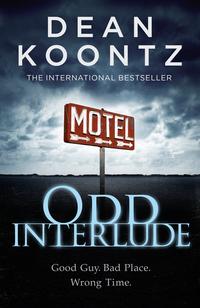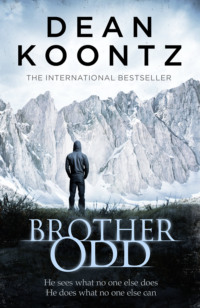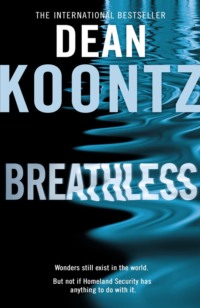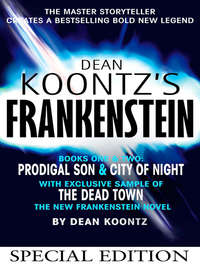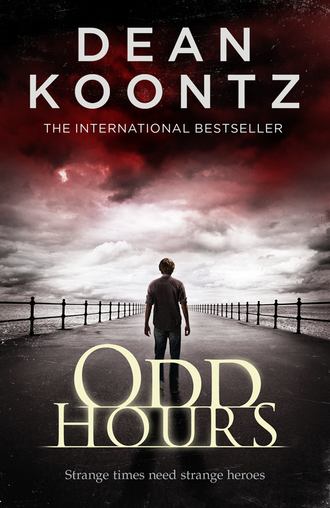
Полная версия
Odd Hours




Copyright
This novel is entirely a work of fiction. The names, characters and incidents portrayed in it are the work of the author’s imagination. Any resemblance to actual persons, living or dead, events or localities is entirely coincidental.
HarperCollinsPublishers Ltd.
1 London Bridge Street
London SE1 9GF
www.harpercollins.co.uk
First published in Great Britain by HarperCollinsPublishers 2008
Copyright © Dean Koontz 2008
Dean Koontz asserts the moral right to be identified as the author of this work
A catalogue record for this book is available from the British Library
All rights reserved under International and Pan-American Copyright Conventions. By payment of the required fees, you have been granted the non-exclusive, non-transferable right to access and read the text of this ebook on-screen. No part of this text may be reproduced, transmitted, down-loaded, decompiled, reverse engineered, or stored in or introduced into any information storage and retrieval system, in any form or by any means, whether electronic or mechanical, now known or hereinafter invented, without the express written permission of HarperCollins ebooks
HarperCollinsPublishers has made every reasonable effort to ensure that any picture content and written content in this ebook has been included or removed in accordance with the contractual and technological constraints in operation at the time of publication
Source ISBN: 9780007267552
Ebook Edition © 2013 ISBN: 9780007287314
Version: 2017-10-16
This fourth Odd adventure is dedicated to Bruce, Carolyn, and Michael Rouleau.
To Michael because he makes his parents proud.
To Carolyn because she makes Bruce happy.
To Bruce because he has been so reliable all these years, and because he truly knows what it means to love a good dog.
I feel my fate in what I cannot fear.
I learn by going where I have to go.
—Theodore Roethke, “The Waking”
Table of Contents
Title Page
Copyright
Dedication
Epigraph
Chapter 1
Chapter 2
Chapter 3
Chapter 4
Chapter 5
Chapter 6
Chapter 7
Chapter 8
Chapter 9
Chapter 10
Chapter 11
Chapter 12
Chapter 13
Chapter 14
Chapter 15
Chapter 16
Chapter 17
Chapter 18
Chapter 19
Chapter 20
Chapter 21
Chapter 22
Chapter 23
Chapter 24
Chapter 25
Chapter 26
Chapter 27
Chapter 28
Chapter 29
Chapter 30
Chapter 31
Chapter 32
Chapter 33
Chapter 34
Chapter 35
Chapter 36
Chapter 37
Chapter 38
Chapter 39
Chapter 40
Chapter 41
Chapter 42
Chapter 43
Chapter 44
Chapter 45
Chapter 46
Chapter 47
Chapter 48
Chapter 49
Keep Reading
About the Author
Also by Dean Koontz
About the Publisher
CHAPTER 1
It’s only life. We all get through it.
Not all of us complete the journey in the same condition. Along the way, some lose their legs or eyes in accidents or altercations, while others skate through the years with nothing worse to worry about than an occasional bad-hair day.
I still possessed both legs and both eyes, and even my hair looked all right when I rose that Wednesday morning in late January. If I returned to bed sixteen hours later, having lost all of my hair but nothing else, I would consider the day a triumph. Even minus a few teeth, I’d call it a triumph.
When I raised the window shades in my bedroom, the cocooned sky was gray and swollen, windless and still, but pregnant with a promise of change.
Overnight, according to the radio, an airliner had crashed in Ohio. Hundreds perished. The sole survivor, a ten-month-old child, had been found upright and unscathed in a battered seat that stood in a field of scorched and twisted debris.
Throughout the morning, under the expectant sky, low sluggish waves exhausted themselves on the shore. The Pacific was gray and awash with inky shadows, as if sinuous sea beasts of fantastical form swam just below the surface.
During the night, I had twice awakened from a dream in which the tide flowed red and the sea throbbed with a terrible light.
As nightmares go, I’m sure you’ve had worse. The problem is that a few of my dreams have come true, and people have died.
While I prepared breakfast for my employer, the kitchen radio brought news that the jihadists who had the previous day seized an ocean liner in the Mediterranean were now beheading passengers.
Years ago I stopped watching news programs on television. I can tolerate words and the knowledge they impart, but the images undo me.
Because he was an insomniac who went to bed at dawn, Hutch ate breakfast at noon. He paid me well, and he was kind, so I cooked to his schedule without complaint.
Hutch took his meals in the dining room, where the draperies were always closed. Not one bright sliver of any windowpane remained exposed.
He often enjoyed a film while he ate, lingering over coffee until the credits rolled. That day, rather than cable news, he watched Carole Lombard and John Barrymore in Twentieth Century.
Eighty-eight years old, born in the era of silent films, when Lillian Gish and Rudolph Valentino were stars, and having later been a successful actor, Hutch thought less in words than in images, and he dwelt in fantasy.
Beside his plate stood a bottle of Purell sanitizing gel. He lavished it on his hands not only before and after eating, but also at least twice during a meal.
Like most Americans in the first decade of the new century, Hutch feared everything except what he ought to fear.
When TV-news programs ran out of stories about drunk, drug-addled, murderous, and otherwise crazed celebrities—which happened perhaps twice a year—they sometimes filled the brief gap with a sensationalistic piece on that rare flesh-eating bacteria.
Consequently, Hutch feared contracting the ravenous germ. From time to time, like a dour character in a tale by Poe, he huddled in his lamplit study, brooding about his fate, about the fragility of his flesh, about the insatiable appetite of his microscopic foe.
He especially dreaded that his nose might be eaten away.
Long ago, his face had been famous. Although time had disguised him, he still took pride in his appearance.
I had seen a few of Lawrence Hutchison’s movies from the 1940s and ’50s. I liked them. He’d been a commanding presence on screen.
Because he had not appeared on camera for five decades, Hutch was less known for his acting than for his children’s books about a swashbuckling rabbit named Nibbles. Unlike his creator, Nibbles was fearless.
Film money, book royalties, and a habit of regarding investment opportunities with paranoid suspicion had left Hutch financially secure in his old age. Nevertheless, he worried that an explosive rise in the price of oil or a total collapse in the price of oil would lead to a worldwide financial crisis that would leave him penniless.
His house faced the boardwalk, the beach, the ocean. Surf broke less than a minute’s stroll from his front door.
Over the years, he had come to fear the sea. He could not bear to sleep on the west side of the house, where he might hear the waves crawling along the shore.
Therefore, I was quartered in the ocean-facing master suite at the front of the house. He slept in a guest room at the back.
Within a day of arriving in Magic Beach, more than a month previous to the red-tide dream, I had taken a job as Hutch’s cook, doubling as his chauffeur on those infrequent occasions when he wanted to go out.
My experience at the Pico Mundo Grill served me well. If you can make hash browns that wring a flood from salivary glands, fry bacon to the crispness of a cracker without parching it, and make pancakes as rich as pudding yet so fluffy they seem to be at risk of floating off the plate, you will always find work.
At four-thirty that afternoon in late January, when I stepped into the parlor with Boo, my dog, Hutch was in his favorite armchair, scowling at the television, which he had muted.
“Bad news, sir?”
His deep and rounded voice rolled an ominous note into every syllable: “Mars is warming.”
“We don’t live on Mars.”
“It’s warming at the same rate as the earth.”
“Were you planning to move to Mars to escape global warming?”
He indicated the silenced anchorman on the TV. “This means the sun is the cause of both, and nothing can be done about it. Nothing.”
“Well, sir, there’s always Jupiter or whatever planet lies beyond Mars.”
He fixed me with that luminous gray-eyed stare that conveyed implacable determination when he had played crusading district attorneys and courageous military officers.
“Sometimes, young man, I think you may be from beyond Mars.”
“Nowhere more exotic than Pico Mundo, California. If you won’t need me for a while, sir, I thought I’d go out for a walk.”
Hutch rose to his feet. He was tall and lean. He kept his chin lifted but craned his head forward as does a man squinting to sharpen his vision, which might have been a habit that he developed in the years before he had his cataracts removed.
“Go out?” He frowned as he approached. “Dressed like that?”
I was wearing sneakers, jeans, and a sweatshirt.
He was not troubled by arthritis and remained graceful for his age. Yet he moved with precision and caution, as though expecting to fracture something.
Not for the first time, he reminded me of a great blue heron stalking tide pools.
“You should put on a jacket. You’ll get pneumonia.”
“It’s not that chilly today,” I assured him.
“You young people think you’re invulnerable.”
“Not this young person, sir. I’ve got every reason to be astonished that I’m not already permanently horizontal.”
Indicating the words MYSTERY TRAIN on my sweatshirt, he asked, “What’s that supposed to mean?”
“I don’t know. I found it in a thrift shop.”
“I have never been in a thrift shop.”
“You haven’t missed much.”
“Do only very poor people shop there or is the criteria merely thriftiness?”
“They welcome all economic classes, sir.”
“Then I should go one day soon. Make an adventure of it.”
“You won’t find a genie in a bottle,” I said, referring to his film The Antique Shop.
“No doubt you’re too modern to believe in genies and such. How do you get through life when you’ve nothing to believe in?”
“Oh, I have beliefs.”
Lawrence Hutchison was less interested in my beliefs than in the sound of his well-trained voice. “I keep an open mind regarding all things supernatural.”
I found his self-absorption endearing. Besides, if he were to have been curious about me, I would have had a more difficult time keeping all my secrets.
He said, “My friend Adrian White was married to a fortune-teller who called herself Portentia.”
I traded anecdotes with him: “This girl I used to know, Stormy Llewellyn—at the carnival, we got a card from a fortune-telling machine called Gypsy Mummy.”
“Portentia used a crystal ball and prattled a lot of mumbo jumbo, but she was the real thing. Adrian adored her.”
“The card said Stormy and I would be together forever. But it didn’t turn out that way.”
“Portentia could predict the day and very hour of a person’s death.”
“Did she predict yours, sir?”
“Not mine. But she predicted Adrian’s. And two days later, at the hour Portentia had foretold, she shot him.”
“Incredible.”
“But true, I assure you.” He glanced toward a window that did not face the sea and that, therefore, was not covered by draperies. “Does it feel like tsunami weather to you, son?”
“I don’t think tsunamis have anything to do with the weather.”
“I feel it. Keep one eye on the ocean during your walk.”
Like a stork, he stilted out of the parlor and along the hallway toward the kitchen at the back of the house.
I left by the front door, through which Boo had already passed. The dog waited for me in the fenced yard.
An arched trellis framed the gate. Through white lattice twined purple bougainvillea that produced a few flowers even in winter.
I closed the gate behind me, and Boo passed through it as for a moment I stood drawing deep breaths of the crisp salted air.
After spending a few months in a guest room at St. Bartholomew’s Abbey, high in the Sierra, trying to come to terms with my strange life and my losses, I had expected to return home to Pico Mundo for Christmas. Instead, I had been called here, to what purpose I didn’t know at the time and still had not deduced.
My gift—or curse—involves more than a rare prophetic dream. For one thing, irresistible intuition sometimes takes me places to which I would not go by choice. And then I wait to find out why.
Boo and I headed north. Over three miles long, the boardwalk serving Magic Beach was not made of wood but of concrete. The town called it a boardwalk anyway.
Words are plastic these days. Small loans made to desperate people at exorbitant interest rates are called payday advances. A cheesy hotel paired with a seedy casino is called a resort. Any assemblage of frenetic images, bad music, and incoherent plot is called a major motion picture.
Boo and I followed the concrete boardwalk. He was a German shepherd mix, entirely white. The moon traveling horizon to horizon moved no more quietly than did Boo.
Only I was aware of him, because he was a ghost dog.
I see the spirits of dead people who are reluctant to move on from this world. In my experience, however, animals are always eager to proceed to what comes next. Boo was unique.
His failure to depart was a mystery. The dead don’t talk, and neither do dogs, so my canine companion obeyed two vows of silence.
Perhaps he remained in this world because he knew I would need him in some crisis. He might not have to linger much longer, as I frequently found myself up to my neck in trouble.
On our right, after four blocks of beachfront houses came shops, restaurants, and the three-story Magic Beach Hotel with its white walls and striped green awnings.
To our left, the beach relented to a park. In the sunless late afternoon, palm trees cast no shadows on the greensward.
The lowering sky and the cool air had discouraged beachgoers. No one sat on the park benches.
Nevertheless, intuition told me that she would be here, not in the park but sitting far out above the sea. She had been in my red dream.
Except for the lapping of the lazy surf, the day was silent. Cascades of palm fronds waited for a breeze to set them whispering.
Broad stairs led up to the pier. By virtue of being a ghost, Boo made no sound on the weathered planks, and as a ghost in the making, I was silent in my sneakers.
At the end of the pier, the deck widened into an observation platform. Coin-operated telescopes offered views of ships in transit, the coastline, and the marina in the harbor two miles north.
The Lady of the Bell sat on the last bench, facing the horizon, where the moth-case sky met the sullen sea in seamless fusion.
Leaning on the railing, I pretended to meditate on the timeless march of waves. In my peripheral vision, I saw that she seemed to be unaware of my arrival, which allowed me to study her profile.
She was neither beautiful nor ugly, but neither was she plain. Her features were unremarkable, her skin clear but too pale, yet she had a compelling presence.
My interest in her was not romantic. An air of mystery veiled her, and I suspected that her secrets were extraordinary. Curiosity drew me to her, as did a feeling that she might need a friend.
Although she had appeared in my dream of a red tide, perhaps it would not prove to be prophetic. She might not die.
I had seen her here on several occasions. We had exchanged a few words in passing, mostly comments about the weather.
Because she talked, I knew she wasn’t dead. Sometimes I realize an apparition is a ghost only when it fades or walks through a wall.
On other occasions, when they have been murdered and want me to bring their killers to justice, they may choose to materialize with their wounds revealed. Confronted by a man whose face has imploded from the impact of a bullet or by a woman carrying her severed head, I am as quick as the next guy to realize I’m in the company of a spook.
In the recent dream, I had been standing on a beach, snakes of apocalyptic light squirming across the sand. The sea had throbbed as some bright leviathan rose out of the deep, and the heavens had been choked with clouds as red and orange as flames.
In the west, the Lady of the Bell, suspended in the air above the sea, had floated toward me, arms folded across her breast, her eyes closed. As she drew near, her eyes opened, and I glimpsed in them a reflection of what lay behind me.
I had twice recoiled from the vision that I beheld in her eyes, and I had both times awakened with no memory of it.
Now I walked away from the pier railing, and sat beside her. The bench accommodated four, and we occupied opposite ends.
Boo curled up on the deck and rested his chin on my shoes. I could feel the weight of his head on my feet.
When I touch a spirit, whether dog or human, it feels solid to me, and warm. No chill or scent of death clings to it.
Still gazing out to sea, the Lady of the Bell said nothing.
She wore white athletic shoes, dark-gray pants, and a baggy pink sweater with sleeves so long her hands were hidden in them.
Because she was petite, her condition was more apparent than it would have been with a larger woman. A roomy sweater couldn’t conceal that she was about seven months pregnant.
I had never seen her with a companion.
From her neck hung the pendant for which I had named her. On a silver chain hung a polished silver bell the size of a thimble. In the sunless day, this simple jewelry was the only shiny object.
She might have been eighteen, three years younger than I was. Her slightness made her seem more like a girl than like a woman.
Nevertheless, I had not considered calling her the Girl of the Bell. Her self-possession and calm demeanor required lady.
“Have you ever heard such stillness?” I asked.
“There’s a storm coming.” Her voice floated the words as softly as a breath of summer sets dandelion seeds adrift. “The pressure in advance weighs down the wind and flattens the waves.”
“Are you a meteorologist?”
Her smile was lovely, free of judgment and artifice. “I’m just a girl who thinks too much.”
“My name’s Odd Thomas.”
“Yes,” she said.
Prepared to explain the dysfunctional nature of my family that had resulted in my name, as I had done countless times before, I was surprised and disappointed that she had none of the usual questions.
“You knew my name?” I asked.
“As you know mine.”
“But I don’t.”
“I’m Annamaria,” she said. “One word. It would have come to you.”
Confused, I said, “We’ve spoken before, but I’m sure we’ve never exchanged names.”
She only smiled and shook her head.
A white flare arced across the dismal sky: a gull fleeing to land as the afternoon faded.
Annamaria pulled back the long sleeves of her sweater, revealing her graceful hands. In the right she held a translucent green stone the size of a fat grape.
“Is that a jewel?” I asked.
“Sea glass. A fragment of a bottle that washed around the world and back, until it has no sharp edges. I found it on the beach.” She turned it between her slender fingers. “What do you think it means?”
“Does it need to mean anything?”
“The tide washed the sand as smooth as a baby’s skin, and as the water winked away, the glass seemed to open like a green eye.”
The shrieking of birds shattered the stillness, and I looked up to see three agitated sea gulls sailing landward.
Their cries announced company: footfalls on the pier behind us.
Three men in their late twenties walked to the north end of the observation platform. They stared up the coast toward the distant harbor and marina.
The two in khakis and quilted jackets appeared to be brothers. Red hair, freckles. Ears as prominent as handles on beer mugs.
The redheads glanced at us. Their faces were so hard, their eyes so cold, I might have thought they were evil spirits if I hadn’t heard their footsteps.
One of them favored Annamaria with a razor-slash smile. He had the dark and broken teeth of a heavy methamphetamine user.
The freckled pair made me uneasy, but the third man was the most disturbing of the group. At six four, he towered half a foot above the others, and had that muscled massiveness only steroid injections can produce.
Unfazed by the cool air, he wore athletic shoes without socks, white shorts, and a yellow-and-blue, orchid-pattern Hawaiian shirt.
The brothers said something to him, and the giant looked at us. He might be called handsome in an early Cro-Magnon way, but his eyes seemed to be as yellow as his small chin beard.
We did not deserve the scrutiny we received from him. Annamaria was an ordinary-looking pregnant woman, and I was just a fry cook who had been fortunate enough to reach twenty-one years of age without losing a leg or an eye, or my hair.
Malevolence and paranoia cohabit in a twisted mind. Bad men trust no one because they know the treachery of which they themselves are capable.
After a long suspicious stare, the giant turned his attention once more to the northern coast and the marina, as did his cohorts, but I didn’t think they were done with us.
Half an hour of daylight remained. Because of the overcast, however, twilight seemed to be already upon us. The lampposts lining the pier brightened automatically, but a thin veil of fog had risen out of nowhere to aid and abet the coming dusk.
Boo’s behavior confirmed my instincts. He had gotten to his feet. Hackles raised, ears flattened, he focused intently on the giant.



